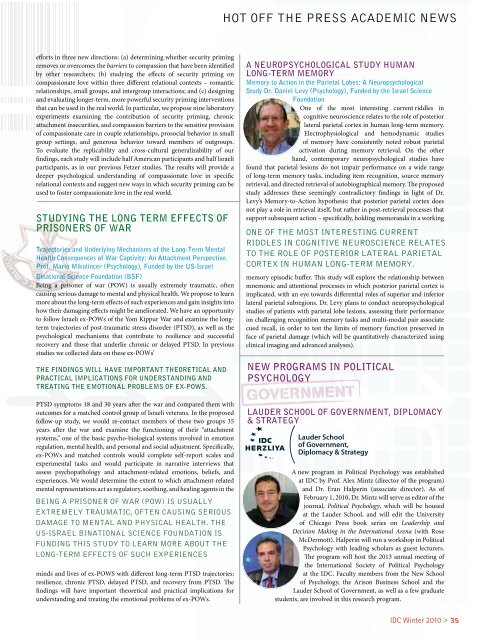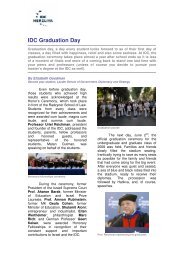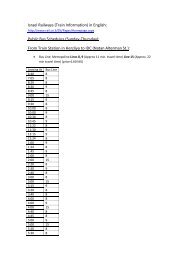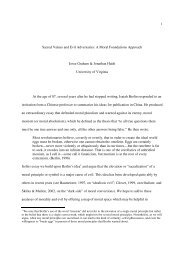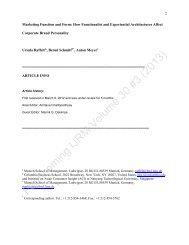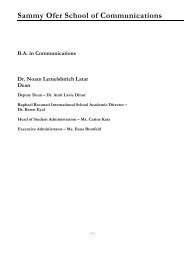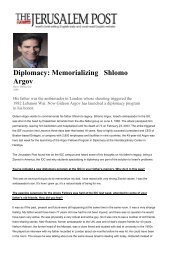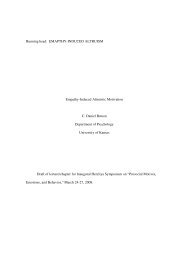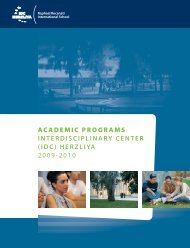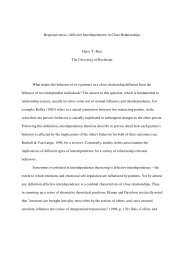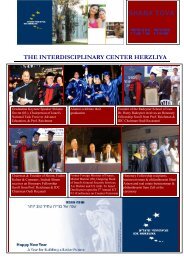The IDC
The IDC
The IDC
Create successful ePaper yourself
Turn your PDF publications into a flip-book with our unique Google optimized e-Paper software.
efforts in three new directions: (a) determining whether security priming<br />
removes or overcomes the barriers to compassion that have been identified<br />
by other researchers; (b) studying the effects of security priming on<br />
compassionate love within three different relational contexts – romantic<br />
relationships, small groups, and intergroup interactions; and (c) designing<br />
and evaluating longer-term, more powerful security priming interventions<br />
that can be used in the real world. In particular, we propose nine laboratory<br />
experiments examining the contribution of security priming, chronic<br />
attachment insecurities, and compassion barriers to the sensitive provision<br />
of compassionate care in couple relationships, prosocial behavior in small<br />
group settings, and generous behavior toward members of outgroups.<br />
To evaluate the replicability and cross-cultural generalizability of our<br />
findings, each study will include half American participants and half Israeli<br />
participants, as in our previous Fetzer studies. <strong>The</strong> results will provide a<br />
deeper psychological understanding of compassionate love in specific<br />
relational contexts and suggest new ways in which security priming can be<br />
used to foster compassionate love in the real world.<br />
STUDYING THE LONG TERM EFFECTS OF<br />
PRISONERS OF WAR<br />
Trajectories and Underlying Mechanisms of the Long-Term Mental<br />
Health Consequences of War Captivity: An Attachment Perspective.<br />
Prof. Mario Mikulincer (Psychology), Funded by the US-Israel<br />
Binational Science Foundation (BSF)<br />
Being a prisoner of war (POW) is usually extremely traumatic, often<br />
causing serious damage to mental and physical health. We propose to learn<br />
more about the long-term effects of such experiences and gain insights into<br />
how their damaging effects might be ameliorated. We have an opportunity<br />
to follow Israeli ex-POWs of the Yom Kippur War and examine the longterm<br />
trajectories of post-traumatic stress disorder (PTSD), as well as the<br />
psychological mechanisms that contribute to resilience and successful<br />
recovery and those that underlie chronic or delayed PTSD. In previous<br />
studies we collected data on these ex-POWs’<br />
THE FINDINGS WILL HAVE IMPORTANT THEORETICAL AND<br />
PRACTICAL IMPLICATIONS FOR UNDERSTANDING AND<br />
TREATING THE EMOTIONAL PROBLEMS OF EX-POWS.<br />
PTSD symptoms 18 and 30 years after the war and compared them with<br />
outcomes for a matched control group of Israeli veterans. In the proposed<br />
follow-up study, we would re-contact members of these two groups 35<br />
years after the war and examine the functioning of their “attachment<br />
systems,” one of the basic psycho-biological systems involved in emotion<br />
regulation, mental health, and personal and social adjustment. Specifically,<br />
ex-POWs and matched controls would complete self-report scales and<br />
experimental tasks and would participate in narrative interviews that<br />
assess psychopathology and attachment-related emotions, beliefs, and<br />
experiences. We would determine the extent to which attachment-related<br />
mental representations act as regulatory, soothing, and healing agents in the<br />
Being A PrisOner Of wAr (POw) is usuAlly<br />
extremely trAumAtic, Often cAusing seriOus<br />
DAmAge tO mentAl AnD PhysicAl heAlth. the<br />
us-isrAel BinAtiOnAl science fOunDAtiOn is<br />
funDing this stuDy tO leArn mOre ABOut the<br />
lOng-term effects Of such exPeriences<br />
minds and lives of ex-POWS with different long-term PTSD trajectories:<br />
resilience, chronic PTSD, delayed PTSD, and recovery from PTSD. <strong>The</strong><br />
findings will have important theoretical and practical implications for<br />
understanding and treating the emotional problems of ex-POWs.<br />
hOt Off the Press AcADemic news<br />
A NEUROPSYCHOLOGICAL STUDY HUMAN<br />
LONG-TERM MEMORY<br />
Memory to Action in the Parietal Lobes: A Neuropsychological<br />
Study Dr. Daniel Levy (Psychology), Funded by the Israel Science<br />
Foundation<br />
One of the most interesting current riddles in<br />
cognitive neuroscience relates to the role of posterior<br />
lateral parietal cortex in human long-term memory.<br />
Electrophysiological and hemodynamic studies<br />
of memory have consistently noted robust parietal<br />
activation during memory retrieval. On the other<br />
hand, contemporary neuropsychological studies have<br />
found that parietal lesions do not impair performance on a wide range<br />
of long-term memory tasks, including item recognition, source memory<br />
retrieval, and directed retrieval of autobiographical memory. <strong>The</strong> proposed<br />
study addresses these seemingly contradictory findings in light of Dr.<br />
Levy’s Memory-to-Action hypothesis: that posterior parietal cortex does<br />
not play a role in retrieval itself, but rather in post-retrieval processes that<br />
support subsequent action – specifically, holding memoranda in a working<br />
One Of the mOst interesting current<br />
riDDles in cOgnitive neurOscience relAtes<br />
tO the rOle Of POsteriOr lAterAl PArietAl<br />
cOrtex in humAn lOng-term memOry.<br />
memory episodic buffer. This study will explore the relationship between<br />
mnemonic and attentional processes in which posterior parietal cortex is<br />
implicated, with an eye towards differential roles of superior and inferior<br />
lateral parietal subregions. Dr. Levy plans to conduct neuropsychological<br />
studies of patients with parietal lobe lesions, assessing their performance<br />
on challenging recognition memory tasks and multi-modal pair associate<br />
cued recall, in order to test the limits of memory function preserved in<br />
face of parietal damage (which will be quantitatively characterized using<br />
clinical imaging and advanced analyses).<br />
NEW PROGRAMS IN POLITICAL<br />
PSYCHOLOGY<br />
LAUDER SCHOOL OF GOVERNMENT, DIPLOMACY<br />
& STRATEGY<br />
A new program in Political Psychology was established<br />
at <strong>IDC</strong> by Prof. Alex Mintz (director of the program)<br />
and Dr. Eran Halperin (associate director). As of<br />
February 1, 2010, Dr. Mintz will serve as editor of the<br />
journal, Political Psychology, which will be housed<br />
at the Lauder School, and will edit the University<br />
of Chicago Press book series on Leadership and<br />
Decision Making in the International Arena (with Rose<br />
McDermott). Halperin will run a workshop in Political<br />
Psychology with leading scholars as guest lecturers.<br />
<strong>The</strong> program will host the 2013 annual meeting of<br />
the International Society of Political Psychology<br />
at the <strong>IDC</strong>. Faculty members from the New School<br />
of Psychology, the Arison Business School and the<br />
Lauder School of Government, as well as a few graduate<br />
students, are involved in this research program.<br />
<strong>IDC</strong> Winter 2010 > 35


